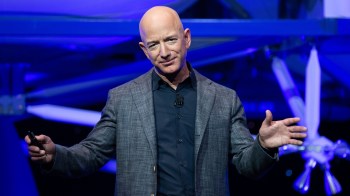Is U.S. doing enough for climate?
TEXT OF INTERVIEW
Steve Chiotakis: The United Nations sponsors climate change talks in December in Copenhagen, Denmark.
And it’ll take consensus from the world’s biggest
polluters to advance the issue and control the
greenhouse gases that are affecting climate.
Former Labor Secretary Robert Reich joins us
this morning to talk about it. Good morning Bob.
Robert Reich: Good Morning Steve.
Chiotakis: So what does the U.S. take to Copenhagen?
Reich: Ah, that’s the big question mark. The House passed a bill last June that sets an overhaul cap on carbon emissions. And the Kerry-Boxer bill is moving through the Senate. It’s very similar.
Chiotakis: And it’s just a matter or reconciling these two bills and then the president signs it before Copenhagen?
Reich: No quite that simple. The real politics here aren’t domestic. They’re between the United States and China — the world’s two biggest emitters of greenhouse gases by humans. China says these bills don’t go nearly far enough to reduce carbon. A lot of the debate, Steve, is over the base year from which you measure how much progress you’ve made on pollution. China and most developing nations want to use 1990. But by that standard, we here in the United States are offering very little. By the year 2020, for example, the cap in the House bill would get us to just about 3 percent under where we were in 1990.
Chiotakis: And why are China, Bob, and other developing nations insisting we do so much more?
Reich: Well, so they can do less. They say they are developing, so their consumers should have the same rights to cars and appliances America and other developed nations have long had.
Chiotakis: But China is already the world’s biggest emitter of greenhouse gases, right? From humans?
Reich: Yes, but that’s because there are over a billion Chinese. Not because their average standard of living is close to Americans. I mean if the typical Chinese citizen had access to the same number of cars and appliances and everything as the typical American, well we could kiss the environment goodbye.
Chiotakis: So we’re going to have to cut a deal with China?
Reich: Yeah, but it’s not going to be ready by Copenhagen. Look, any cut in greenhouse gases is going to be expensive for American consumers, who are in no mood to bear additional costs.
Chiotakis: So what’s in store then?
Reich: It may be awkward Steve. The president picks up his Nobel Peace Prize in Oslo on December 11th, and then he comes to Copenhagen a week later with very little to offer, except the audacity of hope.
Chiotakis: Former Labor Secretary and current professor of public policy, Robert Reich. Bob thanks.
Reich: Thanks Steve.
There’s a lot happening in the world. Through it all, Marketplace is here for you.
You rely on Marketplace to break down the world’s events and tell you how it affects you in a fact-based, approachable way. We rely on your financial support to keep making that possible.
Your donation today powers the independent journalism that you rely on. For just $5/month, you can help sustain Marketplace so we can keep reporting on the things that matter to you.


















